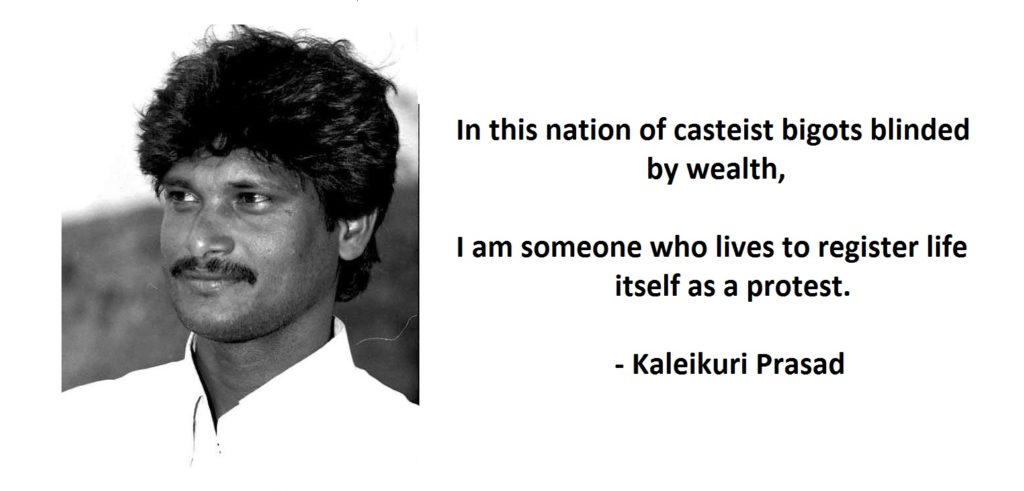
Celebrating Dalit History: The Life of a Revolutionary Poet — Kaleikuri Prasad
Today in Dalit history, we remember Kaleikuri Prasad, a revolutionary poet, author, song-writer, political analyst, literary critic, translator, intellectual, orator, organizer and a leader of the oppressed for three decades. It is through his interview to Dalit Camera in his last days that we get to know his story.
Kaleikuri Prasad was born in a village called Kanchikacherla in Krishna district of Andhra Pradesh. Both his parents were teachers in a missionary school but their salaries would come only once in five-six months and they didn’t really have a comfortable life.Through it all Kaleikuri did get educated and he was a good student. Then, he joined the Andhra Christian College in Guntur which gave him good exposure to friends with different experiences.
At Andhra University, Kaleikuri joined the left movement along with its literary wing called Virasam (Viplava Racheytala Sangham which translates to the Revolutionary Writers’ Association) in 1985 and came out of it after six years in 1991. While he was in the left movement, he closely worked with K.G.Satyamurthy, a well-known Dalit activist in the militant left. Kaleikuri Prasad ran a periodical called Ekalavya along with K.G.Satyamurthy. Talking about the inspiration for his literary genius, Kaleikuri Prasad narrates, “Kanchikacherla was the foundation for the beginning of my writing.” In the year 1968, in Kanchikacherla, when Kaleikuri Prasad was a child, they tied Kotesu, a Madiga youth, to a pole, poured kerosene over him and set him on fire because he was in a relationship with a Kamma girl. He says that, in those days, in the 1960s, the Kamma landlords would call oppressed caste people to their houses and beat them up in their house.
Kaleikuri Prasad heard the story of Kotesu again and again through his childhood and it filled him with anger. This incident later inspired him to write the poem, “For a Fistful of Self-Respect”, an excerpt from this poem is as follows:
“I am the wound of multitudes, the multitude of wounds
For generations, an unfree individual in a free country
Having been the target
Of humiliations, atrocities, rapes and torture
I am someone raising his head for a fistful of self-respect
In this nation of casteist bigots blinded by wealth
I am someone who lives to register life itself as a protest
I am someone who dies repeatedly to live
Don’t call me a victim
I am an immortal, I am an immortal, I am an immortal
I am the poison throated one
Who swallowed the famine so that the world may have wealth”
Source: Dalit Camera
He also penned the Karamchedu Oggu Katha based on the Karamchedu atrocity in 1985. Oggu Katha, Kaleikuri Prasad explains, is a Bahujan art form of storytelling that includes song, narration, and dialogue among three people.
Caste affected Kaleikuri Prasad’s own relationship with an oppressor caste partner that eventually led to his death. His partner was his colleague in Andhra Bhoomi and the daughter of a prominent member of Virasam from the Kamma caste. When he and his partner started living together, several caste privileged members including a Brahmin man from Virasam would come to pacify his partner to get separated from him while ignoring Kaleikuri Prasad in their own house because he was a Dalit which was a humiliating experience for him. No one from Virasam supported his inter-caste relationship. Disillusioned with their politics, he resigned from both Virasam and Andhra Bhoomi and was separated from his partner. Distressed from these humiliating experiences and lack of any support, he took to drinking and the anti-caste movement lost him eventually on May 17th, 2013.
Not only in his own case but also in the movement itself, Kalaikuri Prasad describes how Virasam, an organization that claims to represent the left in the Telugu states, failed to take a strong stand when Karamchedu and Tsunduru happened. Virasam’s neglect of these atrocities gave rise to Dalit Mahasabha in Coastal Andhra.
Further, instead of supporting Dalit Mahasabha, Virasam took to criticizing them. In this context, Kalaikuri Prasad, quotes K.G.Satyamurthy saying Virasam became a sevam (a corpse) when Virasam also failed to stand with him when he left the left movement because of their lack of engagement with the problem of caste.
As history tends to repeat itself, it is important that we remember the story of the Dalit revolutionary Kaleikuri Prasad, truly an immortal. His revolutionary writings will forever live as an inspiration to all the generations to come! Jai Bhim to Kaleikuri Prasad, a martyr! Rest in Power!
THIS POST WAS WRITTEN FOR DALIT HISTORY MONTH BY ANUSHA CHAITANYA





+ There are no comments
Add yours